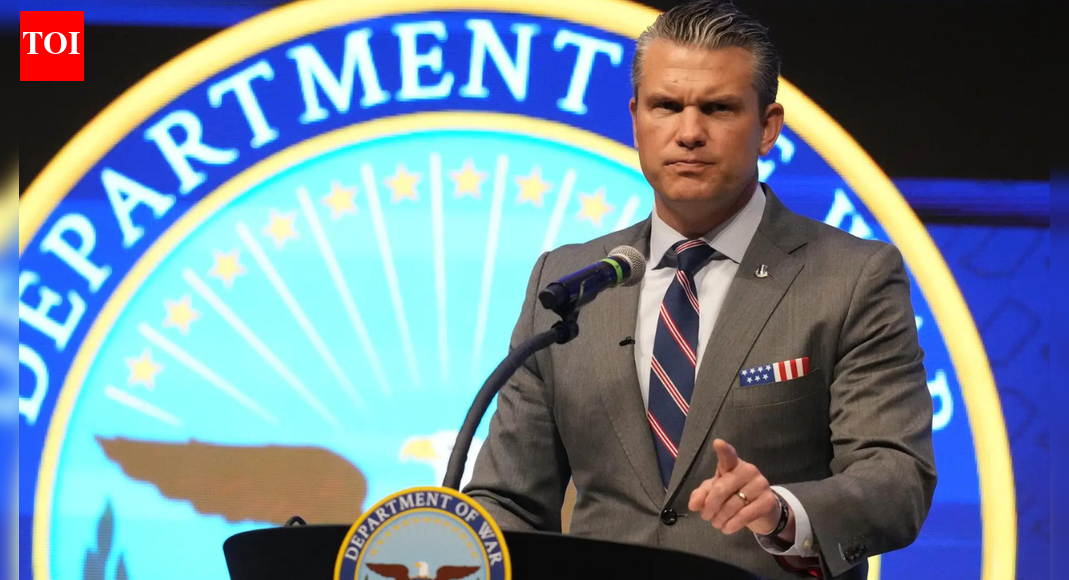US-Nigeria Tensions Escalate: Pentagon Holds Secret Talks Amid Trump's 'Guns-A-Blazing' Military Threat Over Christian Attacks
 Nigeria
International Relations
Nigeria
International Relations

US Secretary of War Pete Hegseth met Nigeria's NSA Mallam Nuhu Ribadu at the Pentagon following Trump's threat of military action over attacks on Christians. Di
US-Nigeria Tensions Escalate: Pentagon Holds Secret Talks Amid Trump's 'Guns-A-Blazing' Military Threat Over Christian Attacks
A high-stakes, closed-door meeting unfolded at the Pentagon recently, bringing together US Secretary of War Pete Hegseth, Joint Chiefs Chairman Gen. Dan Caine, and Nigeria's National Security Adviser Mallam Nuhu Ribadu. The clandestine nature of the Thursday evening talks underscored the urgency of the discussions, which come in the wake of President Donald Trump’s provocative threat to dispatch American troops to Nigeria, as reported by ABC News.
Trump's Bold Threat and Hegseth's Affirmation
This diplomatic encounter was triggered by Trump's earlier social media warning, where he vowed swift military intervention if Nigeria failed to curb attacks on its Christian population. Trump's post explicitly instructed the Department of War to prepare for potential operations, stating, “If the Nigerian Government continues to allow the killing of Christians, the USA will immediately stop all aid and assistance to Nigeria, and may very well go into that now disgraced country, ‘guns-a-blazing,’ to completely wipe out the Islamic Terrorists who are committing these horrible atrocities.” Secretary Hegseth publicly affirmed, “Yes sir, the Department of War is preparing for action.”
Nigeria's Stance and Regional Complexities
Independent conflict monitors, including the Armed Conflict Location and Event Data Project, highlight that tens of thousands of civilians, both Christian and Muslim, have perished in Nigeria due to violence in recent years. Meanwhile, Nigeria has vociferously rejected Washington's re-designation of the country as a “Country of Particular Concern” over alleged religious-freedom violations. President Bola Ahmed Tinubu asserted that this characterization “does not reflect our national reality.”
Logistical Hurdles for US Military Intervention
Deploying US ground troops to Nigeria would present significant logistical and political challenges. The nation’s vast and diverse terrain, coupled with its porous borders and anticipated public resistance, complicates any potential military operation. While the US maintains approximately 6,500 military personnel across Africa, it currently has no permanent troop presence within Nigeria. Moreover, counterterrorism drone operations in the region have faced new hurdles since the US was compelled to vacate critical bases in neighboring Niger following a military coup, officials confirmed earlier.
Diplomacy and De-escalation Efforts
Despite the escalating rhetoric, US officials are seeking a diplomatic resolution. A senior State Department official conveyed to CNN that the Nigerian delegation’s visit opened avenues for “frank conversations,” emphasizing Washington’s desire to enhance safety for “religious communities of all stripes” in Nigeria. US lawmakers have also pressed Abuja for demonstrable action, with Rep. Riley Moore reportedly conveying expectations for “tangible steps” to prevent violence against Christian communities.
Sources cited by CNN indicate a heightened willingness from Nigeria to collaborate with the US military following Trump's stern warning. US Africa Command is reportedly ready to deepen cooperation if formally requested. With critical discussions unfolding simultaneously at the Pentagon and Capitol Hill, officials on both sides are signalling an urgent collective effort to prevent the contentious dispute from spiraling into a full-blown international crisis. The sensitive nature of the discussions was evident as the meeting, confirmed by defense officials, was absent from public schedules and kept off-limits to the press.